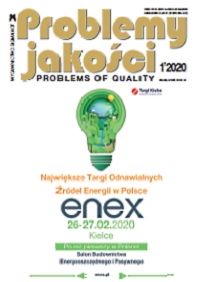
- Qualitative determinants of civilization development
The aim of the article is to try to familiarize humanists with the technical aspects of the development of civilization, while engineers and economists with a humanistic view of technology and economics. Nowadays, the dynamic development of the sciences, when the accumulated knowledge exceeds the possibility of being embraced by one man, a common synergy of people of good will becomes a necessity in everyday processes. But for this synergy to occur, we need to understand other people's points of view as a society. The article consists of four parts, in which the main determinants of civilization development are described. In the first part, regarding economics, the author reminds us where we came from as organized societies. In the second chapter, regarding technology, the author focuses on the strength of the human mind and the desire to make life easier for himself. In the third chapter, concerning religion, the author emphasizes its important role in the life of societies. Finally, the fourth chapter deals with art as an important means of non-verbal communication.
- The role of strategic information in creating value
The purpose of the article is to discuss the strategic information system of the "organization of the future" focusing on the process approach taking into account the perspective of analyzing "from outside to inside" the organization, treating information about the organization's resources as information of strategic importance, identifying activities that create value. It was found that the ability to manage strategic information in an organization is a key success factor, necessary for transformational changes, organizational culture changes and other changes needed to function in a rapidly changing environment. The role of improving processes enabling the creation, dissemination and use of information to achieve the organization's goals, increase job satisfaction and commitment was emphasized.
- Knowledge transfer as one of the knowledge management processes in an organization operating in the conditions of the KBE
Entities operating in a knowledge-based economy should pay attention to intangible factors, including knowledge. It is now one of the main resources of the organization, and its effective use can bring many benefits. The transfer of knowledge within an organization is important for the use, development and creation of new knowledge. It allows the transfer of knowledge to places where it is necessary. Knowledge transfer is inseparably connected with the concept of knowledge sharing in an organization, thanks to which employees can acquire the necessary knowledge and skills and expand and develop them. The aim of the article is to indicate the place of knowledge, knowledge management and knowledge transfer in the organization and to present selected research results on knowledge sharing. The aim of the work was achieved through the analysis of literature in the field of knowledge management as well as research results regarding knowledge transfer and sharing in organizations in the Lubelskie Voivodeship. The article consists of a theoretical and empirical part. The theoretical part focuses on understanding knowledge, knowledge management, knowledge-based economy and the process of knowledge transfer and knowledge sharing in an organization. The empirical part presents selected research results regarding the possibility of sharing knowledge and support provided by the organization for the implementation of this process. Research results show that the vast majority of entities create opportunities and opportunities to transfer and share knowledge. Unfortunately, less than half of the respondents declare that they use tools and solutions supporting organizations in the process of knowledge transfer.
- Report from the 17th National Scientific Conference "Organizational and economic aspects of the functioning of a modern organization"
On December 16, 2019, at the Faculty of Economics at the Maria Curie-Skłodowska University, another cyclical scientific conference was organized by the Student Circle of Quality and Knowledge Management operating at the Department of Intellectual Capital and Quality. The conference was opened by the Dean of the Faculty of Economics prof. Radoslaw Mącik. Four sessions were held during the conference, 15 papers were delivered. During the conference, research results of 1st, 2nd and 3rd degree students were presented. Introductory paper "Organizational agility and its implications" was delivered by prof. Elżbieta Skrzypek (guardian of the Circle). Selected problems related to the functioning of the agile and turquoise organization as well as issues related to the functioning of the consumer on the market were also presented. The importance of information quality in managing the organization and trends in the behavior of modern consumers - from consumerism to sustainable consumption - were also pointed out. In the conditions of progressing digitization, the role of social media is growing, which is why the impact of marketing activities in social media on consumer purchasing decisions is shown on the example of LPP.
Problemy Jakości (Quality Problems) - full list







